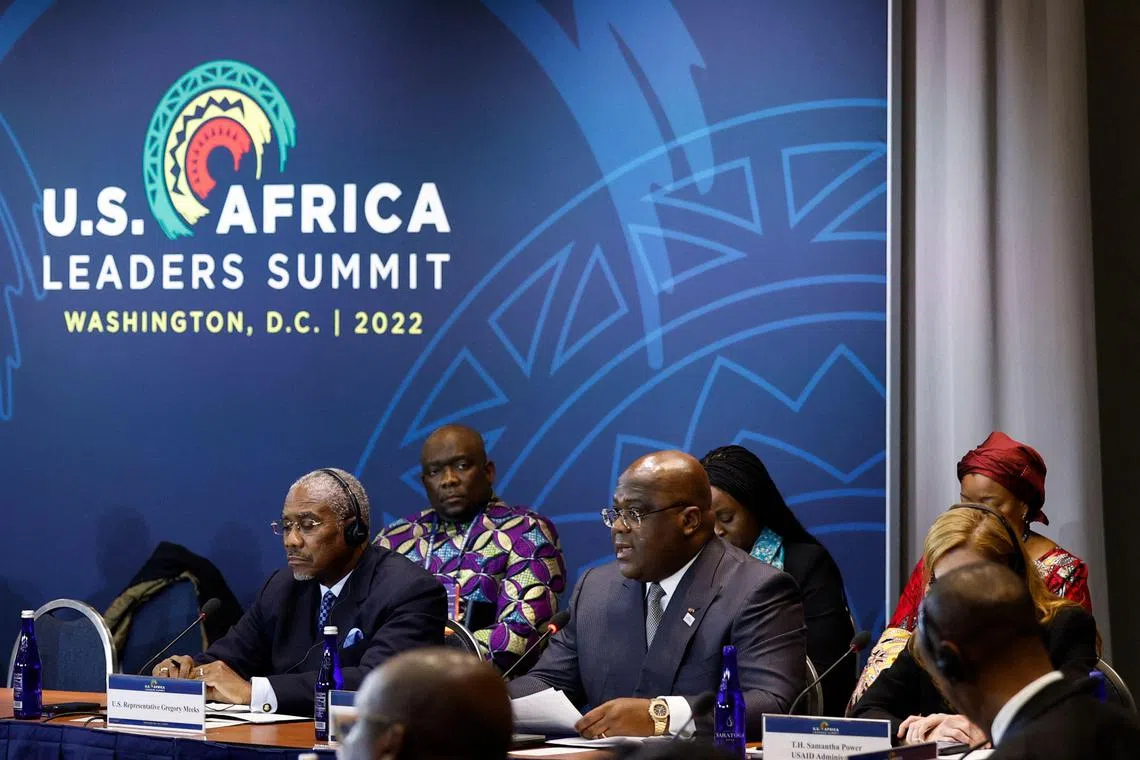China an unspoken focus as Biden woos African leaders
Sign up now: Get ST's newsletters delivered to your inbox

Delegations from 49 African countries and the African Union are attending the three-day summit.
PHOTO: AFP
WASHINGTON - When President Joe Biden speaks to African leaders in Washington on Wednesday, expect to hear about support for democracy, economic development and new financial commitments for a region that in recent years has taken a backseat to other United States priorities.
But there will be another, likely unspoken message: The US is a better partner for Africa than China.
Delegations from 49 countries and the African Union, including 45 African national leaders, are attending the three-day summit, which began on Tuesday. It is the first of its kind since 2014. Washington was expected to also tout its support for food security and climate change.
It is part of a renewed push to boost ties with a continent where US interests have been challenged by China’s security ambitions and trade, investment and lending drives. By contrast, Beijing has held its own high-level meetings with Africa every three years for more than two decades.
While Sino-US competition is a clear backdrop, US officials have been reluctant to frame the gathering as a battle for influence. Washington has toned down its criticism of Beijing’s lending practices and infrastructure projects amid calls from some African leaders for more US leadership.
To that end, Mr Biden is expected to announce his support for the African Union’s joining the Group of 20, grouping the world’s largest economies, as a permanent member.
US Trade Representative Katherine Tai told African counterparts on Tuesday she wants to improve the continent’s US trade preferences programme, and national security adviser Jake Sullivan said Washington will “bring resources to the table” and commit US$55 billion (S$74 billion) to Africa over the next three years.
“We are not looking for a relationship that is transactional, that’s extractive, that is burdensome, or leaves various countries in a more fragile, poor state after a deal is done,” State Department spokesman Ned Price told reporters on Monday, skirting mention of China but using language that mirrored Washington’s critique of its behaviour in Africa.
Growing sway
China’s economic influence in Africa is undeniable. According to a Eurasia Group analysis, in 2021 China-Africa trade, at US$254 billion, greatly outstripped US-Africa trade, which stood at US$64.3 billion.
Those figures are up from $US12 billion and US$21 billion, respectively, in 2002. China has also become an important creditor by offering loans with less stringent conditions than Western lenders.
That has led to Western charges that China has mired African countries in debt. Beijing’s ambassador to Washington, Qin Gang, rejected the idea ahead of the summit, citing a report that African countries owe three times more debt to Western institutions, while noting that Chinese-built hospitals, highways, airports and stadiums are “everywhere” in Africa.
China remains the region’s largest bilateral investor, but its new loan commitments to Africa have declined in recent years as pressure has built up both inside and outside China for its infrastructure investments to be more sustainable.
Offering loans to Africa on the same scale as China has not been a viable option for the United States. Instead, US officials stress an approach focused on facilitating private investment.
Mr Don Graves, the deputy secretary of commerce, said this week that US companies brought leading technologies and standards “as opposed to bringing in tens of thousands of our own workers”, thinly veiled criticism of long-standing practices by Chinese companies that have angered Africans.
Secretary of State Antony Blinken said on Tuesday the US would announce investments for exchange programmes for African students, and to support African entrepreneurs and small businesses.
It is not all about economic sway – Washington has been alarmed by China’s efforts to establish a military foothold, including on the Atlantic coast in Equatorial Guinea.
For their part, many African leaders reject the idea that they need to choose between the US and China.
“The fact that both countries have different levels of relations with African countries makes them equally important for Africa’s development,” said Ethiopia’s United Nations ambassador Taye Atske Selassie Amde. “However, it should be known each African country has the agency to determine their respective relationship and best interest.” REUTERS


